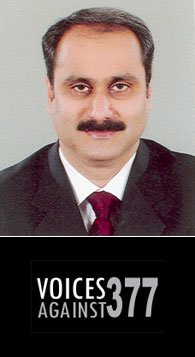Speaking at an international AIDS conference in Mexico City last week, Health Minister Anbumani Ramadoss expressed his ministry's support of legalising same sex relations to advance the fight against HIV/AIDS.

Top: Health Minister Anbumani Ramadoss. In 2006, Indian luminaries including writer Vikram Seth, Nobel laureate and economist Amartya Sen, former Attorney-General Soli Sorabjee and former UN Under-Secretary General Nitin Desai launched an open letter calling for the repeal of Section 377 of the Indian Penal Code. The Voices Against 377 coalition, which is hosting the letter on voicesagainst377.org, is calling for more signatories.
"Structural discrimination against those who are vulnerable to HIV such as sex workers and men having sex with men must be removed if our prevention, care and treatment programmes are to succeed," he told a 250-member audience at an India session at the 17th International Conference on AIDS in Mexico City which ended last Friday.
The minister's comments are the most direct to date although his ministry had earlier registered their support of the repeal in the Delhi High Court in May. During the hearing of a petition which sought to legalise sexual relations between consenting adults of the same sex, the court heard that the Ministry of Home Affairs favoured the retention of Section 377.
The petition was first filed in 2002 by non-profit group, Naz Foundation, which is seeking the exclusion of sexual acts between consenting adults by reading down Section 377 which criminalises sexual relations between men as well as other acts including oral and anal sex between adults of any biological sex, punishable by 10 years in prison.
The court had directed the central government to arrive at a consensus and submit its reply by September 18.
The National Aids Control Organization (NACO) estimates that about 100,000 of the 2.5 million MSM in India are at high risk of HIV because of multiple sexual relationships and commercial sex work, and about 15 percent of MSM in the country are living with HIV/AIDS.
Aside from hindering HIV prevention, activists also argue that the laws against homosexuality contribute to the harassment, abuse and victimisation of LGBTI persons by the police and society.
Arvind Narrain, an attorney for the Alternative Law Forum, a Bangalore-based human rights group, wrote in his column ''What's law got to do with it?'' which was republished on Fridae: "The insidious impact of Section 377 also permeates different social settings like workplaces, families, hospitals and the popular press and ultimately creates a popular understanding of homosexuality as perverse, dirty and illegal. This in turn legitimises violence against LGBTI persons. Section 377 provides the fig leaf of legitimacy to the harassment of LGBTI persons by families, the medical establishment and other official institutions."
In 2006, Indian luminaries including writer Vikram Seth, Nobel laureate and economist Amartya Sen, former Attorney-General Soli Sorabjee and former UN Under-Secretary General Nitin Desai launched an open letter calling for the repeal of Section 377 of the Indian Penal Code. The Voices Against 377 coalition, which is hosting the letter on voicesagainst377.org, is calling for more signatories.
